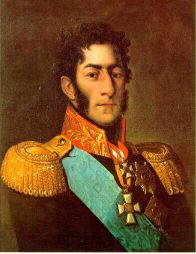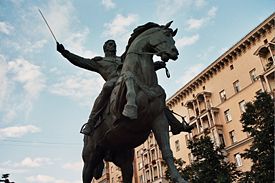Pyotr Bagration

Prince Pyotr Ivanovich Bagration (Georgian: პეტრე ბაგრატიონი, Petre Bagrationi, Russian: Пётр Иванович Багратион) (1765 - 24 September [O.S. 12 September] 1812) served as a Russian general. He was an ethnic Georgian and descendant of the Georgian royal family of the Bagrations.
Contents |
Life
He was born in 1765, in Kizlyar (Dagestan, Northern Caucasus). His father was a Georgian prince, Colonel Ivane Bagrationi. His brother Roman (Revaz) Bagrationi was also a general of the Russian army.
Bagration entered the Russian army in 1782, and served for some years in the Caucasus. He participated in the Siege of Ochakov (1788), and in the Polish campaign of 1794. His merits were recognized by Suvorov, whom he accompanied in the Italian and Swiss campaign of 1799, winning particular distinction by the capture of the town of Brescia.

In the wars of 1805 Bagration's achievements appeared even more brilliant. With a small rearguard he successfully resisted the repeated attacks of forces five times his own numbers at the Battle of Hollabrunn (1805), and though half his men fell, the retreat of the main army under Kutuzov was thereby secured. At Austerlitz (2 December 1805) Bagration fought against the left wing of the French army commanded by Murat and Lannes. He fought bravely and obstinately at the battles of Eylau (7 February 1807), Heilsberg (11 June 1807) and Friedland (14 June 1807).
During the Finnish Campaign of 1808, by a daring march across the frozen Gulf of Finland, Bagration captured the Åland Islands, and in 1809 he led the Russian army against the Turks at the battles of Rassowa and Tataritza. In 1809 he was promoted to General of Infantry.
In 1812 Bagration commanded the 2nd army of the West, and though defeated at Mogilev (23 July 1812), rejoined the main army under Barclay de Tolly, and led the left wing at the Battle of Borodino (7 September 1812), where he received a mortal wound. He died on 24 September, in the village of Simi, which belonged to his aunt.
Honours
Tsar Nicholas I had a monument erected in his honour on the battlefield of Borodino. The general's remains were transferred to the place where he had fallen and remain there to this day. The grave was blown up during World War II (reputedly, the local museum authorities only being able to save shreds of bone and cloth from the grave) but has since then been restored.
Joseph Stalin chose Bagration as the name of the Soviet Union's June 22, 1944, successful offensive that defeated the German Army Group Centre and drove the forces of Nazi Germany out of what is now Belarus. After the war, the Soviet Union annexed northern East Prussia, and the until-then German town of Preußisch Eylau—scene of the 1807 battle—was renamed Bagrationovsk in his memory.
Pronunciation
The name Bagration is not pronounced "bag-ration" as many people think when reading War and Peace for the first time. By English-speakers used to Italian names it is often pronounced "Ba-gratsi-ON," but in Russian it is pronounced bah-grah-tee-ON. The Georgian pronunciation is bah-grah-tee-on-i, with no significant stress.
References
- Alexander Mikaberidze, The Lion of the Russian Army: Life and Military Career of Prince General Peter Bagration, 2 volumes, (doct. diss., Florida State University, 2003)
- General Bagration: Sbornik dokumentov i materialov, pod redaktsiei S.N. Golubova [General Bagration: Compilation of Documents and Materials], (Moscow, 1945)
- Bagration v Dunaiskikh kniazhestvakh: Sbornik Dokumentov [Bagration in the Danubian Principalities: Compilation of Documents], (Chisineu, 1949)
- Tsintsadze, Zurab, Bagration Voennaia Deiatelnost General Petra Ivanovicha Bagrationa, 1782-1812, [Military Career of General Peter Ivanovich Bagration, 1782-1812] (Moscow, 1997);
- V. Gribanov, Bagration v Peterburge [Bagration in St. Petersburg] (Leningrad 1979)
- I.I. Rostunov. "P.I. Bagration" (a monograph), Moscow, 1947 (in Russian)
- T. Lomouri. "Petre Bagrationi" (a monograph), Tbilisi, 1946 (in Georgian)
- N. Nakashidze. "Hero of Borodino", Tbilisi, 1961 (in Georgian)